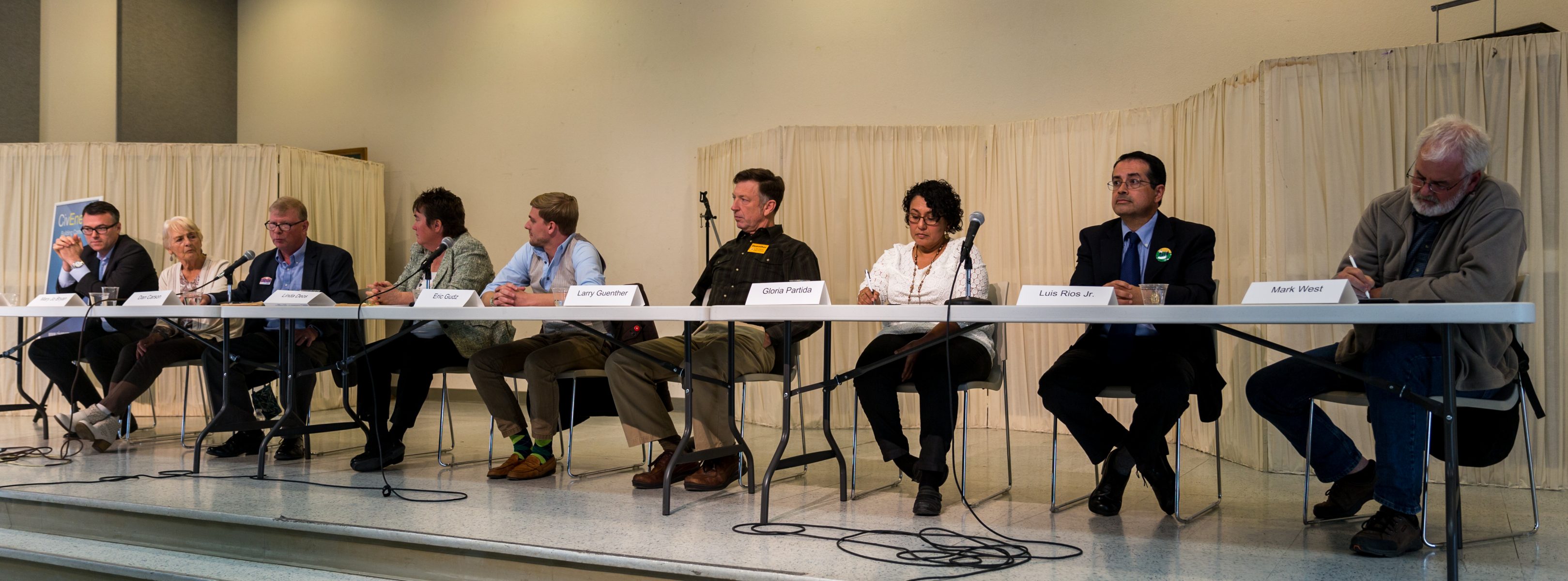
It was a packed house on Sunday afternoon to get the first big chance to see all nine of the council candidates in action. The forum at Davis Community Church was hosted by CivEnergy and moderated by former Davis Mayor Ann Evans.
Each candidate was allowed to give an opening and closing comment and then was asked three two-minute questions. The Vanguard will break up those answers into three separate articles.
The third question was: “Take one issue in your platform and explain why you think it’s important to the city of Davis and explain your plan to address the issue.”
 Luis Rios
Luis Rios
Luis Rios explained that since he started campaigning, he’s talked to a lot of people and many young families say they moved to Davis because of the quality of schools and the community, “Davis is facing a housing crisis. We need to develop housing. We need smart planning.”
He said, “We need to convene realtors, developers, business leaders. We are all stakeholders here, and we need to convene and establish partnerships and find ways of building homes for people to live in.”
Mr. Rios said he grew up in Yolo County and “I live here because it’s a small town. A lot of people I have encountered, they live here because they enjoy the community, the small town flavor, the small town character, that’s why I’m here.”
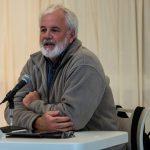 Mark West
Mark West
Mark West said, “The city now admits to an $8 million deficit in our roughly $50 million general fund. I say admits to, because they denied they had a deficit for several years even though its obvious to those looking at the data that one existed.
“We’ve got tens of millions of dollars of unfunded obligations that we have created over time,” he said. “The city has to start paying its bills. And the way we need to do that is by increasing our revenues. Not by taxations – making life more expensive for everybody – but by generating more business activity through economic development.”
Mr. West explained, “The definition of economic development is to create more opportunities for residents to improve their quality of life. That’s what we need to do creating new jobs so that people can have a chance to improve their life and also so the city can generate more revenue.”
He argued that a city our size should have a general fund closer to $100 million than $50 million. “The reason we don’t is because we haven’t allowed businesses to expand in town,” he said.
The current general plan, now nearly 20 years old, talks about the need to develop 120 acres in town. “IT was thought to be necessary 20 years ago, in order for the city to have enough revenue to pay its bills. We didn’t do it – we didn’t expand at all. We haven’t made the effort to create the businesses that we need to pay the bills that we’ve run up. If we want to do that – address our challenges now rather than passing it off to our children and grandchildren to pay for, it’s time for us to start implementing the plans that we’ve had over the years.
“We’ve talked about building business, and we haven’t done it. It’s time to start doing it.”
 Ezra Beeman
Ezra Beeman
Ezra Beeman chose to go with the issue of fiscal sustainability. “My plan to address fiscal sustainability is to look at the revenue side of the equation and look for the opportunities and I think the Valley Clean Energy is going to be a key part of bridging the revenue gap,” he said.
“I think looking at how we better harness the UCD professors that are creating great intellectual property in creating an incubator for commercialization of the IP is something that I want to turn my attention to.”
He noted he has started new businesses along the lines of new technology.
He explained that “fiscal sustainability is two parts. First is on the revenue side. The second is on the cost side.”
On the cost side, he asked, “Are we operating efficiently?” He talked about “benchmarking” and looking at how we’re doing things compared to how cities like San Luis Obispo or Corvallis are doing things.
“The other element is trying to control unnecessary costs,” he said. He said, “Given that we’re going to the community to raise more taxes, why is it that we added 15 new rolls to a base of about 423, which is in rough terms about $3 to $4 million of annual additional liability. If we didn’t hire those folks, we’d already be halfway to annual $8 million shortfall.”
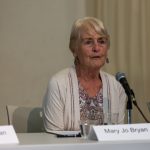 Mary Jo Bryan
Mary Jo Bryan
Mary Jo Bryan explained, “My main platform, and the reason why I’m here, is because I have witnessed – in regards to some of the issues that I’ve been involved with, specifically the Cannery and also the Sterling project – the need for more planning.”
She explained, “We are basically doing piecemeal planning in regards to the way our general plan reads.”
Ms. Bryan said, “I really want to see an update to our general plan, starting with a citizens review committee to really look at the housing needs of Davis. With the housing needs of Davis looked at and delineated, then we would redo the general plan to reflect those housing needs.”
She said we would then go forward and “find out if we can – and how we can –– actually implement those housing needs. That might mean we need to look at our land, and how it is so expensive that we cannot build homes that we need – the middle income homes for people who want to move here.”
She said this is something we should look at before we look at Measure J/Measure R. “Before that, we can really sit down and come together and actually see where Davis wants to be in twenty years, and how we get there – what we’re able to compromise with.”
“We can’t keep doing what we’re doing now – or else all we will be is a community of very high end homes except for those who can qualify for all the affordable income homes,” she said.
“I want to get that middle back,” she added. “The homes that we were able to buy when we moved here 40, 30 even 20 years ago and then be able to our better diversity of population.”
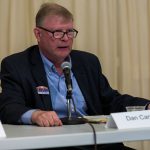 Dan Carson
Dan Carson
Dan Carson said, “I would like to talk about how I would like to change and improve the relationship between the city of Davis and the UC Davis campus. Any day now the campus is going to release a new plan that by their numbers will increase the campus population by 24 percent for the next ten or twelve years.”
He said that the “campus is a hub, it’s an important part of the vibe of this community. I think the city is very important to the campus.”
But he said, “But that next wave of campus will aggravate the budget and housing problems that we’re all very familiar with. We need to create an effective two way working relationship like Santa Cruz has done, like Berkeley has done.”
He said that the City of Berkeley gets a $2 million revenue stream from UC Berkeley. “And it’s an effective two-way relationship they’re working together has resulted in opportunities for additional student housing and economic development in downtown Berkeley.”
Mr. Carson, “We need to cut the same kind of deals and get the same kind of advantages that these other college communities have been provided. I think we can really help each other.”
He said, “I really want to know… what we can do to help them succeed.”
 Linda Deos
Linda Deos
Linda Deos explained, “The number one issue on all of my materials deals with housing. And deals with providing entry-level housing for our community here.”
She said coming out of college she was renting a room, then an apartment, “after that with my girlfriend and I, we were able to get a 900 square foot home in Sacramento. We all start from somewhere and from that home I was able to get to a larger home to the place I’m at now in Davis.”
She said, “What we are lacking now in Davis is those entry-level homes. We don’t have any more of those split-lot duplexes that many of us started out with here in Davis. We don’t have any more available multi-unit housing for folks to get their start at here.”
Ms. Deos stated, “I would like to go forward by working with our developers, look at the projects coming on line and tell us, “show us more housing that’s in that size of the 1100 square foot, the 900 square foot. The developers want us to downsize from our big homes into other sorts of homes over on Covell. That’s great but I’m not going to downsize from a 2200 to another 2200 square foot home. I might downsize to something half that size.”
She added, “Multi-unit housing is essentially not just for students who need units in town but also for other working professionals coming into Davis who want to stay in Davis.
“We all are going to share in enhanced housing here in Davis,” she said.
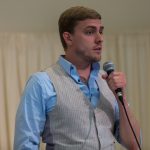 Eric Gudz
Eric Gudz
Eric Gudz pointed out that in a community that is over 50 percent renters, that he stands “as the only individual before you who is a current renter, who’s living paycheck to paycheck, who understands the realities of over half of this town that is struggling to access the Davis dream. My first and foremost priority is to represent and ensure that we are not going to lose the rest of those within that space to other places outside of our community.
“Bolstering our renter protections is very important to me,” he said. He said renter protections is something “I will be fighting for every single day on the council.”
He talked about “providing the steps and the pathway for our young professionals who are falling outside of the grasp of being able to be a part of the Davis dream – giving them the tools that they need to be able to succeed.”
He noted the importance of upgrading fiber optics and promoting broadband. He talked about the need for micro-homes and accessory dwelling units. He talked about the need to incentivize “those who have land within the town, giving them the opportunity and incentives through the city to be able to subdivide some of their land… to be able to help divide some of that pathway to help pitch in as part of the community to solve the problem.”
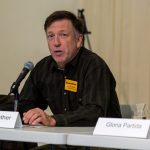 Larry Guenther
Larry Guenther
Larry Guenther said, “I don’t like to think of any one issue in a vacuum. I think the best solutions are elegant solutions that really address more than one issue.”
He said, “I think the downtown is a really good analogy – microcosm – of the city as a whole.”
Mr. Guenther explained that he is on the downtown advisory committee and he hears a lot of people talking about more people living in the downtown. That would allow people to not to have to focus on the automobile for transportation. There’s also “everybody’s concern about the vacant store fronts.
“This is an area where a great solution addresses, if not all of the problems in Davis, a lot of the big ones,” he said.
Mr. Guenther said, “If we do it right, we get housing that people can afford. IF the housing is designed so that people can afford it. If it’s smaller square footage.”
He said, “Getting those store fronts filled with local businesses redeveloping downtown and the rest of Davis so that we get the multi-use out of each square foot. That helps the housing situation. That helps the economic development situation – especially if we ensure that these developments actually pay for themselves.
“It reduces our carbon footprint if people can live downtown, walk downtown, walk to the train station, if they don’t have to commute to their job outside of Davis, but actually work in Davis.”
Mr. Guenther added that “it can also improve our quality of life,” he said, noting that people walking and living downtown “brings more and better businesses downtown.”
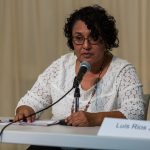 Gloria Partida
Gloria Partida
Gloria Partida stated, “I think our relationship with the university is key to everything we do.”
She noted that the university “drives how many people live here. They drive the cost of our housing up. They drive our economic development.” Ms. Partida added, “It’s absolutely imperative that our relationship with the university be productive.
“We need to partner,” she said. She said, “We need to drive our economic development up. It is the thing that can help us financially – be financially solvent. It is probably the best thing for us to do.
“We have to expand our tax base,” she continued. “Expanding our tax base is not just for businesses, it’s also building more homes.
“Building our housing in Davis is something that people are the most vocal about and I think that we have to be very collaborative in how we do that and we also have to be very brave in how we do that,” she added.
City Council Candidates Meet for CivEnergy Forum – Question 1
City Council Candidates Meet for CivEnergy Forum – Question 2
—David M. Greenwald reporting





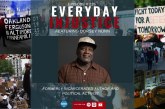

Quoted Text
“But that next wave of campus will aggravate the budget and housing problems that we’re all very familiar with. We need to create an effective two way working relationship like Santa Cruz has done, like Berkeley has done.”
He said that the City of Berkeley gets $2 million revenue stream from UC Berkeley. “And it’s an effective two-way relationship they’re working together has resulted in opportunities for additional student housing and economic development in downtown Berkeley.”
Mr. Carson, “We need to cut the same kind of deals and get the same kind of advantages that these other college communities have been provided. I think we can really help each other.”
So Dan does this mean that now, in certain circumstances, you are prepared to advocate that the City sue UCD, (as indeed Berkeley and Santa Cruz did their home universities, and as you implicitly argued in an article just over a year ago)? If so, what are those circumstances, and what would you advocate suing for: infrastructural mitigation expenses; traffic restrictions; limitations on the growth of student enrollment; failure of UCD to build on-campus according to a timetable (all part of suits by Berkeley and Santa Cruz)? And are you prepared, as a candidate, to commit to advocating a lawsuit in any circumstances for any purpose. If not, what exactly does the above statement by you mean?
I’m going to guess Dan (Carson) is not supportive of suing, but would like to work with the campus to et some sort of agreement.